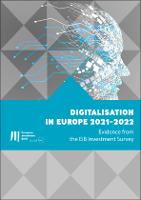Digitalisation in Europe 2021-2022
Evidence from the EIB Investment Survey
| dc.contributor.author | European Investment Bank | |
| dc.date.accessioned | 2022-08-08T05:32:24Z | |
| dc.date.available | 2022-08-08T05:32:24Z | |
| dc.date.issued | 2022 | |
| dc.identifier | OCN: 1327999770 | |
| dc.identifier.uri | https://library.oapen.org/handle/20.500.12657/57836 | |
| dc.description.abstract | "The coronavirus crisis accelerated the digital transformation of Europe’s economy. Before the pandemic, cutting-edge digital technologies were primarily used by the most innovative and modern firms. The COVID-19 crisis, however, brought the digital transformation to the larger society — and made digitalisation integral to firms’ survival. Digital firms were better able to cope with the disruption unleashed by the pandemic, and they were less likely than non-digital firms to see sales decline significantly from 2020 onwards. Many of them used the crisis an opportunity to accelerate their digitalisation. The Digitalisation in Europe 2021-2022 report uses results from the EIB Investment Survey (EIBIS), conducted from April to July 2021, to shed light on the level of digitalisation among Europe’s small and medium firms." | |
| dc.language | English | |
| dc.rights.uri | Copyright held by content provider | |
| dc.subject.classification | thema EDItEUR::K Economics, Finance, Business and Management::KF Finance and accounting::KFF Finance and the finance industry::KFFK Banking | en_US |
| dc.subject.other | Business & Economics | |
| dc.subject.other | Banks & Banking | |
| dc.title | Digitalisation in Europe 2021-2022 | |
| dc.title.alternative | Evidence from the EIB Investment Survey | |
| dc.type | book | |
| oapen.identifier.doi | 10.2867/7625 | |
| oapen.relation.isPublishedBy | European Investment Bank | |
| oapen.relation.isbn | 9789286152337 | |
| oapen.collection | Knowledge Unlatched (KU) | |
| oapen.identifier | https://openresearchlibrary.org/viewer/6339d2f8-eeeb-4d1f-acb9-da57f1528a5c | |
| oapen.identifier.isbn | 9789286152337 |

